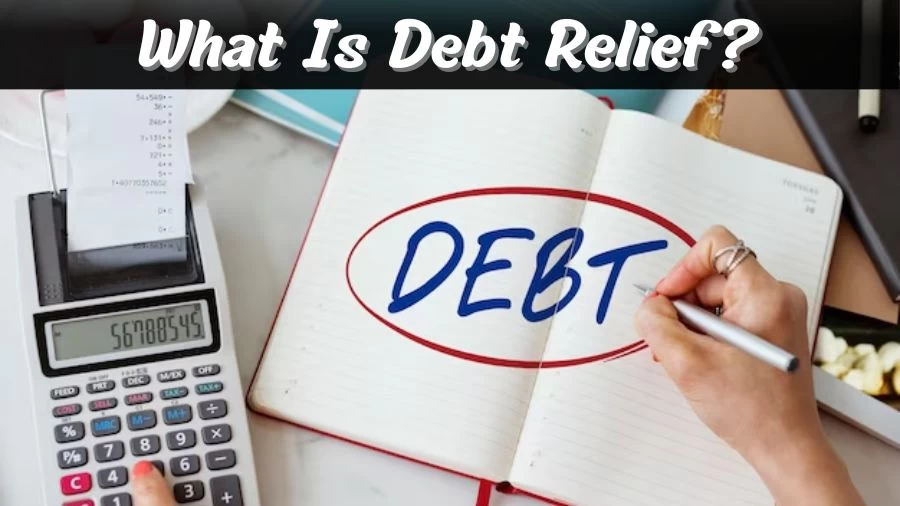
What is Debt Relief? and How Does Debt Relief Work?
Debt relief involves renegotiating debt terms to facilitate repayment, though it's important to note that it can potentially influence credit scores and is accompanied by fees.
by Sai V
Published Aug 28, 2023 | Updated Aug 28, 2023 | 📖 12 min read
On This Page
- What is Debt Relief?
- How Does Debt Relief Work?
- Debt Relief Programs Texas
- How Do Debt Relief Companies Function?
- What is the Impact of Debt Settlement on Your Credit Scores?
- What Should Individuals Know Before They Decide to Apply for Debt Relief?
- When Do You Need to Seek Debt Relief?
- What Sets Apart Debt Relief From Debt Consolidation?
What is Debt Relief?
Debt relief refers to the restructuring of a debtor's financial obligations with the aim of facilitating smoother repayment. It also offers creditors an opportunity to recover a portion of the outstanding sum. The spectrum of debt relief strategies includes debt reduction, interest rate reduction, or elongating the repayment duration, among various alternatives. Typically, creditors are open to exploring debt relief options when faced with the prospect of the borrower defaulting entirely.
The scope of eligible beneficiaries for debt relief encompasses individuals, small enterprises, large corporations, municipalities, and even entire nations. In this context, the present article zeroes in on debt relief within the realm of individual finances.The concept of debt relief involves the strategic rearrangement of a borrower's fiscal liabilities to establish a more feasible pathway for reimbursement.
Concurrently, this approach permits creditors to reclaim a certain proportion of the owed funds. Diverse methods of debt relief can encompass diminishing the debt quantum, lowering the applied interest rate, or prolonging the timeline allocated for reimbursement, among a myriad of other possibilities. When confronted with the imminent risk of a borrower defaulting on their obligations, creditors often exhibit a willingness to consider and implement debt relief measures.
The spectrum of potential beneficiaries for such remediation extends from individuals and minor businesses to major corporations, local governing bodies, and even entire sovereign states. This article's focal point resides in elucidating the dimensions of debt relief as applicable to individual economic scenarios.
How Does Debt Relief Work?
Debt relief functions involve specialized companies that operate as for-profit entities. These companies charge individuals for their services, which primarily revolve around negotiating with the creditors to whom the individuals owe money. The core objective of these negotiations is to persuade creditors to agree to a settlement that is less than the total amount of debt owed.
These firms often highlight the potential to substantially reduce outstanding debt burdens. While this may appear enticing, it's essential to recognize that the strategies employed by debt relief companies can have detrimental repercussions on an individual's creditworthiness. Here are some key insights into their operational procedures:
Initiating the Process: Before initiating negotiations with creditors, debt relief companies usually advise individuals to halt their regular debt payments. Instead, they suggest making predetermined monthly payments into a dedicated savings account, which is often established by the company itself and may involve associated fees. Over the course of several months, these funds accumulate with the intention of eventually negotiating with the creditors.
Representation and Negotiation: Acting on the individual's behalf, the debt relief company enters into negotiations with the creditors. Their primary argument revolves around convincing the creditors that accepting a partial repayment of the debt is more favorable than receiving no payment at all. Implicit in this argument is the notion that the individual's financial situation is dire and that the creditors might recover even less if the individual opts for bankruptcy.
Settlement Success: If the negotiations conducted by the debt relief company are successful, they usually retain a portion of the achieved debt reduction, typically ranging from 20% to 25%. Additionally, the company might impose charges for maintaining the savings account or other ancillary services. Using the accumulated funds, the company then proceeds to satisfy the reduced debt on behalf of the individual.
Debt Relief Programs Texas
If you find yourself burdened by credit card debt and in need of effective debt relief solutions, the state of Texas offers a range of options to alleviate your financial strain. Whether you're seeking assistance from nonprofit credit counseling agencies, financial institutions, or online lenders, there are several pathways available to help you conquer your credit card debt. Below, we outline five distinct debt relief programs tailored to your unique needs:
Debt Management Programs: Regaining Financial Control:
Debt management programs are designed to significantly reduce the interest rates on your credit card debt, often lowering them to around 8%. This reduction can make a substantial difference, especially when compared to the average credit card interest rate of 16.7%. By enrolling in this program, you can experience a more manageable monthly payment and channel the savings towards faster debt repayment. Notably, your credit score doesn't impact your eligibility for enrollment. The program typically spans 3-5 years, ensuring that you can become debt-free within a reasonable timeframe.
Pros:
- Drastically reduces interest rates.
- No credit score requirements for enrollment.
- Realistic timeline for debt elimination.
Cons:
- Exiting the program might lead to interest rate restoration.
Debt Consolidation Loans: Streamlining Payments:
Debt consolidation loans offer a way to simplify your debt management by combining multiple credit card debts into a single loan. By doing so, you consolidate your debt and make just one monthly payment to the lending institution. The interest rate for these loans depends on your credit score and whether you're willing to provide collateral. This option is particularly beneficial for those with good credit scores (670 or higher) who can commit to halting credit card usage.
Pros:
- Single monthly payment.
- Lower interest rates compared to credit cards.
- Efficient repayment structure.
Cons:
- Risk of accumulating new credit card debt.
Debt Settlement: Negotiating a Fresh Start:
Debt settlement programs allow you to settle your debt for less than the total amount owed. However, this process involves negotiation and a lump-sum payment, typically after saving for 2-3 years. While it can significantly reduce your debt, it may also damage your credit report for up to seven years. Additionally, forgiven debt over $600 is considered taxable income.
Pros:
- Potential to settle debt for less.
- Offers an alternative to bankruptcy.
- Credit card companies receive some payment.
Cons:
- Lengthy process.
- Credit score impact.
- Potential for hidden fees.
Nonprofit Debt Settlement: A Structured Approach:
Nonprofit debt settlement programs, introduced in 2021, provide an alternative approach. Rather than lengthy negotiations, the program's terms are predetermined, requiring fixed payments over 36 months. The benefit is the absence of interest during this repayment period, making it a viable solution for those struggling with overwhelming credit card debt and limited income.
Pros:
- Predetermined terms.
- Zero interest during repayment.
- Suitable for consumers with limited income.
Cons:
- Limited availability.
Bankruptcy: A Last Resort:
Bankruptcy is a challenging but sometimes necessary option for individuals facing insurmountable debt. It offers a fresh start for your financial situation, allowing you to reorganize your finances. Two primary types of bankruptcy, Chapter 7 and Chapter 13, come with their own implications and processes. While bankruptcy can relieve you of debt, it also carries long-term credit score consequences.
Pros:
Fresh start for severe financial distress.
Protection of essential assets.
Cons:
- Significant credit score impact.
- Long-lasting credit report notation.
How Do Debt Relief Companies Function?
Debt relief companies play a crucial role in assisting consumers in reducing their debt burdens and managing repayment challenges, albeit for a fee. It's essential to note that these fees should not be demanded upfront; instead, they ought to be applied only once the consumer's debt issues have been successfully addressed.
Typically, these companies initiate the process with an initial evaluation to determine the consumer's eligibility and to ascertain the most appropriate strategy to pursue. Nevertheless, it's of utmost importance for individuals to approach this process well-informed, fully aware of all the potential avenues available to them. This proactive approach equips consumers with the knowledge to engage in meaningful discussions with the debt relief company, ensuring a more informed decision-making process.
What is the Impact of Debt Settlement on Your Credit Scores?
The potential adverse ramifications of opting for debt settlement can wield a substantial influence on your credit records and credit scores. The negative entries linked with debt settlement, encompassing resolved accounts, delayed or missed payments, and the relocation of accounts to collection agencies, possess the capability to induce a marked reduction in your credit scores.
The degree of this impact hinges on the quantity and character of the unfavorable entries on your credit report, as well as the initial standing of your credit score prior to the unfolding of these detrimental occurrences. The most noteworthy dip in your credit score is likely to manifest when these unfavorable entries are fresh. However, over the passage of time, their repercussions on your credit score may wane, even though certain entries may linger on your credit report for a span of up to seven years.
In certain instances, if your attempts at debt settlement do not yield successful outcomes, you might find yourself left with no recourse but to declare bankruptcy. This represents one of the most severe adverse events that can make an appearance on your credit report. Depending on the category of bankruptcy settlement you file for, its presence can endure on your credit report for a period ranging from seven to ten years.
Bankruptcy exerts a significantly detrimental impact on credit scores, and although its sway over credit scores diminishes as time elapses, numerous lenders may display reluctance to extend loans to individuals who bear a bankruptcy notation on their credit report.
What Should Individuals Know Before They Decide to Apply for Debt Relief?
Before individuals decide to pursue debt relief, there are several crucial factors they should take into account. While debt relief programs can offer a pathway to alleviate the burden of debt, it's imperative to approach this decision with careful consideration. It's not a one-size-fits-all solution, and there could be substantial trade-offs involved.
Interest Considerations:
Debt relief options, such as debt consolidation loans, lines of credit, and 0% balance transfer offers, can potentially provide relief from overwhelming credit card debt. Nevertheless, it's essential to weigh the associated costs. The primary goal of consolidating debt is to secure a lower interest rate. This lower Annual Percentage Rate (APR) translates to a more significant portion of monthly payments chipping away at the principal balance, expediting debt repayment while curbing interest accumulation.
As you contemplate how to consolidate your debt, it's wise to assess the interest rates accessible based on your credit score. If you're considering a debt management plan, inquire about the possibility of negotiating a reduced interest rate as part of the repayment arrangement.
Fee Evaluation:
Different debt relief options might come with assorted fees that necessitate careful consideration before committing. For instance, credit counseling services may or may not entail fees for devising a budget and spending strategy. Debt consolidation loans might carry origination fees and penalties for prepayment. Opting for a 0% APR balance transfer credit card to consolidate debt could involve balance transfer fees.
Enrolling in a debt management plan could entail monthly fees. Furthermore, companies specializing in debt settlement may impose charges for their services, often ranging from 15% to 25% of the resolved or forgiven amount. Given that these fees can contribute to the overall repayment sum, it's vital to comprehend these costs upfront and gauge their long-term impact.
Vigilance Against Scams:
When contemplating debt relief service whether credit counseling, debt management plans, or debt forgiveness it's paramount to ascertain the legitimacy of the service provider. Falling victim to a debt relief scam can have dire consequences. Additionally, understanding the nuances differentiating debt consolidation, debt management plans, and debt settlement is crucial. The terminology employed by debt relief providers might not always be crystal clear, necessitating careful scrutiny.
During your assessment of potential debt relief companies, stay alert for warning signs like upfront fee demands, opacity in explaining services, requests for sensitive personal or financial information, and extravagant promises that appear too good to be true. Trusted resources such as the Consumer Financial Protection Bureau (CFPB) database and the Better Business Bureau can serve as valuable tools to verify the credibility of a debt relief company.
When Do You Need to Seek Debt Relief?
There are specific scenarios: if repaying unsecured debt within five years seems unfeasible despite extreme cost-cutting, or if the total unsecured debt amounts to half or more of your gross income. Conversely, if there's potential to clear your debts within five years, self-managed alternatives like debt consolidation and strict budgeting can be considered. This methodical approach aids individuals in making informed choices about addressing their unsecured debt concerns.
- If you find it impossible to settle unsecured debts (such as credit cards, medical bills, personal loans) within a five-year timeframe, even after implementing drastic spending cuts.
- If the total amount of unsecured debt that you owe is equal to or more than half of your gross income.
Conversely, if you have the potential to repay your unsecured debts within five years, you might contemplate a self-directed strategy. This could encompass a mixture of methods like consolidating debts, negotiating with creditors, and adopting a more stringent budgeting approach.
What Sets Apart Debt Relief From Debt Consolidation?
Debt relief firms often coordinate a singular monthly payment to be made by the debtor, which they then utilize to settle outstanding balances with creditors on the debtor's behalf. This process may encompass fee extraction by the relief company. This procedure, sometimes labeled as "debt consolidation" by these firms, is a misrepresentation that doesn't capture the core concept and advantages of authentic debt consolidation.
On the contrary, legitimate debt consolidation is a strategy free from third-party intervention or charges. It revolves around procuring a loan with a comparatively lower interest rate and utilizing the acquired funds to fully repay existing high-interest debts. This approach replaces numerous demanding monthly debt payments with a solitary, more manageable payment scheduled at a reduced interest rate.
The implications include simplified financial planning, streamlined bill settlement procedures, and the potential for considerable interest savings over the repayment period, facilitating a more effective debt clearance journey.
What is Debt Relief - FAQs
1. What is debt relief?
Debt relief involves restructuring debts for smoother repayment, benefiting both debtors and creditors.
2. How does debt relief work?
Debt relief companies negotiate with creditors to reduce debt and offer more manageable repayment terms.
3. What are common debt relief programs in Texas?
Debt relief programs in Texas include debt management, consolidation loans, settlement, nonprofit settlement, and bankruptcy.
4. How does debt settlement affect credit scores?
Debt settlement can lower credit scores due to resolved accounts and missed payments, with impacts lasting up to seven years.




